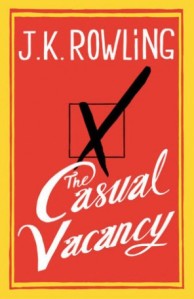B lurb:
lurb:
Private investigator Cormoran Strike returns in a new mystery from Robert Galbraith, author of the #1 international bestseller The Cuckoo’s Calling. When novelist Owen Quine goes missing, his wife calls in private detective Cormoran Strike. At first, Mrs. Quine just thinks her husband has gone off by himself for a few days–as he has done before–and she wants Strike to find him and bring him home. But as Strike investigates, it becomes clear that there is more to Quine’s disappearance than his wife realizes. The novelist has just completed a manuscript featuring poisonous pen-portraits of almost everyone he knows. If the novel were to be published, it would ruin lives–meaning that there are a lot of people who might want him silenced. When Quine is found brutally murdered under bizarre circumstances, it becomes a race against time to understand the motivation of a ruthless killer, a killer unlike any Strike has encountered before… A compulsively readable crime novel with twists at every turn, THE SILKWORM is the second in the highly acclaimed series featuring Cormoran Strike and his determined young assistant, Robin Ellacott
Review:
The Silkworm is the tenth J.K. Rowling novel I’ve read. I believe that after ten often gargantuan novels I can make fairly accurate generalizations about her writing. And it saddens me to say that she keeps making the same mistakes.
Most glaring is her treatment of female characters. In the Cormoran Strike mystery series, we have another female character of much greater intrigue shunted to the side in favor of a male protagonist, aka Hermione Granger Syndrome. Robin is Strike’s young personal assistant who could definitely contribute to mystery solving but mostly answers phones, schedules appointments, makes coffee, and provokes male gazing. The thing is, Robin is much more fascinating to me than Strike! Robin is desperate, unsure, diffident but ambitious—she would have been a fabulous heroine for a detective series about a woman trying to break into a traditionally male profession. Strike, on the other hand, does not interest me as a protagonist: he’s arrogant and infallible (sorta reminds you of a character whose name rhymes with Barry Lotter, non?), meaning that whenever Strike eliminates a suspect from contention, I know him to be absolutely right, simply because J.K. Rowling writes Strike in a way that he is always right. For all of Rowling’s characterization skills, Strike is lacking. He has a cool backstory—missing leg, missing rockstar father—but none of it manifests itself in his psyche or quotidian actions. They are just things we know about him; like, oh hey, that’s Cormoran Strike, he lost his leg in Afghanistan and his dad is a famous guitarist.
In general, I find J.K. Rowling’s characterization maddeningly brilliant. She’s super into the physicality of her characters. In The Silkworm the first few chapters serve no other purpose than to introduce the story’s players. But we are told who these people are, with special emphasis on their attractiveness and one-word descriptors: he’s the ambitious one and she’s the daffy one. Rowling is an expert at character portraits but you can only know the characters on her unique terms; there’s no room for personal interpretation. It’s as if she is this master dollmaker. Each character is impeccably painted, you can admire the surface details for hours, but if you cracked the dolls open, they’d be hollow. Nothing murks beneath the detailed yet limited picture Rowling has painted us.
And yet, she’s a magnificent plotter, a skill really well-suited to the mystery genre which gives me hope for any subsequent installments (though I will perpetually groan about Strike’s usurpation of the protagonist role in lieu of Robin). She carefully charts her reveals and includes tons of clever but useless information to throw you off. I’m not the biggest fan of how she writes climaxes—this isn’t participatory mystery where you can solve alongside the detective; you must wait for Mind-Numbingly Boring Detective Genius Cormoran Strike to figure it out and share his conclusions with you—but the underlying plot structure is solid. I’d just love to see her combine this knack for plot with deepened characters and themes. Otherwise, it’s forgettable.
